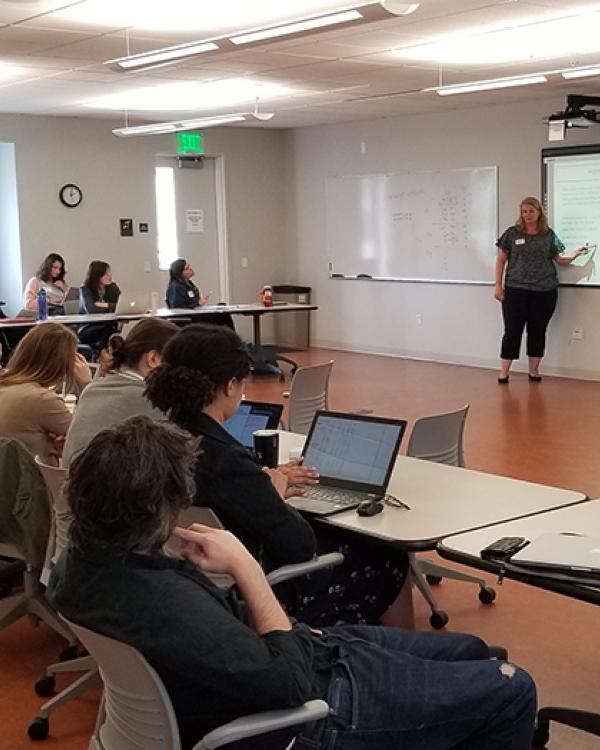
Capacity building for education scholars includes a wide range of opportunities to stay up to date on research skills. One such way is to keep up on the ever growing statistical approaches through workshops that tend to follow similar delivery formats. Department of Education Professor Karen Nylund-Gibson is rethinking the approach of these trainings to make these methods accessible to those doing equity-focused scholarship.
The need for such critical training is underlined by the National Science Foundation (NSF) and the Institute of Education Sciences (IES) providing training grants for Nylund-Gibson to expand this work. Such parallel funding circumstances--a $999,345 grant from the NSF and a $799,964 grant from IES--no doubt came about since Nylund-Gibson is not only providing training in an under-utilized and often misunderstood form of quantitative research, but she’s also going to provide that training in a novel way.
Nylund-Gibson is one of the country’s recognized experts in mixed modeling, a statistical modeling approach that’s not taught at the graduate level at many schools. To oversimplify, the method takes lots of pieces of information to look for groupings. “A lot of people are learning it on their own and that is not a great thing,” Nylund-Gibson asserts. “That propagates not the best use, not the best understanding, and then things get through the pipeline and published that are not best science, so this is a reason to get ahead of that.”
More importantly, according to Nylund-Gibson, “The applications of this statistical approach are wide and vast. One of the key benefits is not relying on traditional ways of creating groups that can be based on antiquated ways, often based on discriminatory theories. For example, creating groups of high achievers’ and ‘low achievers,’ which rely on a single standardized test score that have been shown to have a range of biases. At its core this approach has an equity lens to it.” The equity focus is a major reason both granting agencies chose to fund her projects.
Her IES Methods Training for Education Research Program is called the Institute of Mixture Modeling for Equity-Oriented Researchers, Scholars, and Educators (IMMERSE). Nylund-Gibson and her co-PIs Dr. Marsha Ing of UC Riverside and Dr. Katherine Masyn of Georgia State University will recruit two cohorts of scholars to engage in a year long, intensive training program involving online synchronous and asynchronous mixture modeling training. Additionally, the fellows will come to visit UCSB for a three-day in-person training and community building event, followed by the year of intensive mentoring and ongoing professional learning.
“I’ve taught week-long courses in mixture modeling at places like Methods U, but I’ve done that for so long that I realize the inefficiencies,” Nylund-Gibson points out. “It’s better than nothing, of course, and you come back with a large set of detailed lecture materials. However, they will all have these gaps in their understanding that only becomes apparent when you get back to their own data. You are less likely to apply a new statistical method when you don’t have the support at that critical point. So that’s why I thought, ‘We’ve got to do this differently.’ We really need to have ongoing mentoring so that when researchers are back home at their computer and encounter a problem, they have an opportunity to get help. It’s one thing to learn the method in the classroom, it’s another to use it on your own data. So we’re taking a different approach in this grant–it’s really unique.” Along with the mentoring, she and a team of UCSB graduate students will also build a free web-based site of resources on this statistical approach to help other scholars not in the mentoring program have access to the method.
The NSF grant focuses on an entirely different audience. It will fund the new Institute on Equity-Oriented Mixture Modeling for Discipline-Based Education Research Scholars. The Institute will train Discipline-Based Education Research (DBER) scholars in the use of mixture modeling to address pressing DEI issues in STEM education. Nylund-Gibson believes that combined the grant work has “potentially really important impact on outcomes for students at all levels, not just K-12, as the DBERS often focused on college and graduate school.” For example, she singles out UCSB colleague Mike Wilton in Molecular, Cellular, and Developmental Biology, a DBER who is interested in mentoring programs that train undergrads to mentor lower level undergrads.
Currently she and her research team are recruiting widely. Nylund-Gibson says, “We’re going to seek out scholars for these projects—twelve for IES, ten for NSF—that are doing research related to equity in the largest sense, ideally diverse scholars themselves, that we can train and mentor for a year in a way that increases the likelihood that they can integrate the method into their scholarship.”